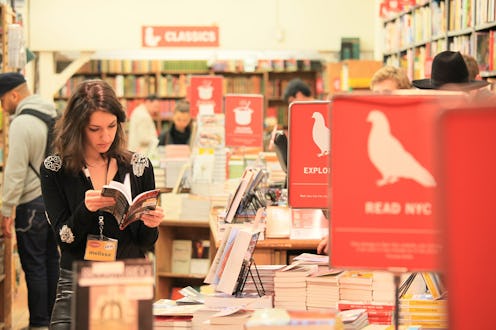Books
Print or E-Books: Which Are Selling More?

Although the great debate between print versus e-books will likely never die (spoiler alert: not the news in this post), it's always interesting when numbers of any kind factor into the debate. Enter a new survey by Nielsen, which says that new paperbacks and hardcovers are still outselling e-books. Of the formats, paperback was most popular with 42 percent of sales, hardcover next at 25 percent, and e-books were third at 23 percent. The last 10 belonged to other formats. But that means that 67 of sales belongs to beloved print books.
So, are you surprised? I'm not. For years, there's been the looming prediction that the e-book market would cannibalize print's dominance, and we've all been waiting for the other shoe to drop... but it just hasn't. Print is retaining the allure that we at times can articulate — the desire to hold something tactile; the ability to gift; the possibility of sharing; the fear that we don't want our book to run out of batteries — and that je ne sais quoi we sometimes can't. That's kept it going strong.
Despite the fact that print seems to have been holding on, marketers have been busy safeguarding against the tidal wave of e-books regardless, going lengths to make hardcovers treasured possessions, using technology like 3-D printing or enlisting artists to redesign classics into collectibles. Print has continued to evolve and take extra value, even — much in the way that vinyl has, not allowing itself to be completely cannibalized by a market of digital music downloads. I think that's pretty cool.
Because of those reasons, I'm confident print will always have a big chunk of sales. There will always be room for both print and e-books — I guess we'll just have to see how the numbers shake out as the years tick by.
One thing I'm curious about: Since students are such big advocates of using print to study, I'm interested to see how a survey like this breaks down in the next couple of years if bookless libraries start to become the norm, and students really start to switch over to e-book culture. (Academic publishers are beginning to provide their whole catalogs through digital download, à la Spotify, to universities, as e-books instead of print, which could accelerate the transition.)
So, sure, these numbers are great news for print-lovers, but why can't it be good news for everyone? At Electric Literature, Lincoln Michel says, "Different formats have different strengths, and it is a great thing that there is a healthy ebook market and a healthy print market. The so-called 'format wars' may turn out not to be a war at all. Instead, we may see that the various formats can work together to expand literature and create more readers and markets."
Cheers to that.
Image: scatto_felino, jamjar/flickr; Penguin Books